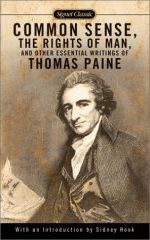
This day, June 8th marks the 200 year anniversary of Thomas Paine. Paine is much more than a pampheteer, he was a writer, a philosopher, and an amazing revolutionary figure of the 18th century.
Paine was born in Great Britain on January 29, 1737 until he was 27 when he moved to the American Colonies and took part in the Revolutionary War. He wrote Common Sense in 1776 which he argued for the rights of the Colonies:
Society in every state is a blessing, but government, even in its best state, is but a necessary evil; in its worst state an intolerable one; for when we suffer or are exposed to the same miseries by a government, which we might expect in a country without government, our calamity is heightened by reflecting that we furnish the means by which we suffer. Later, Paine wrote The Rights of Man in 1791 which advocated Enlightenment ideals and supported the French Revolution. Although neither a French speaker or a French national, because of his literary contributions, Paine was elected as a member of the 1792 French Convention. While in France, Paine also wrote The Age of Reason which introduces the concept of deism and advocated free-thinking which did later cause controversy back in the States: It is necessary to the happiness of man, that he be mentally faithful to himself. Infidelity does not consist in believing, or in disbelieving; it consists in professing to believe what he does not believe. However, Napoleon Bonaparte's dictatorship disillusioned Paine and caused him to end his long stay in France. Paine later returned to America on the request of Thomas Jefferson. Paine died in Greenwhich Village, New York at the age of 72. Later William Cabbot tried to have Paine's remains moved to Great Britain but were lost so the final resting place of Paine is unknown. However Paine's home in New Rochelle, New York known as Thomas Paine's Cottage is still around today
Review by Rainey
 RSS Feed
RSS Feed